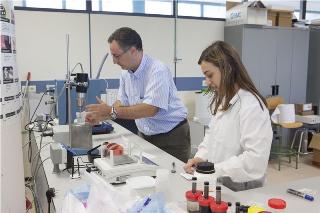Oct 25 2014
Researchers at the Universitat Jaume I (UJI) have developed and patented a nanofluid improving thermal conductivity at temperatures up to 400°C without assuming an increase in costs or a remodeling of the infrastructure.
 Multiphase Fluids Group. Author: Àlex Pérez (UJI)
Multiphase Fluids Group. Author: Àlex Pérez (UJI)
This progress has important applications in sectors such as chemical, petrochemical and energy, thus becoming a useful technology in all industrial applications using heat transfer systems such as solar power plants, nuclear power plants, combined-cycle power plants and heating, among other. The nanofluid developed by the Multiphase Fluids research group at the UJI is the first capable of working at high temperatures (up to 400°C), and it offers enhanced thermal conductivity properties (an increase of up to 30%) of existing heat transfer fluids.
The heat exchange fluid for high temperature applications that has been patented also has the advantage that it does not compromise other relevant variables, such as the stability of the fluid at high temperatures.This characteristic allows it to be used in current facilities, without the need for any changes to be made to infrastructures in order to adapt them. The cost of this new nanofluid (to which nanoparticles are added in order to enhance and improve heat conductivity) is similar to that of the base fluid, since both the nanoparticles and the stabilizers used are inexpensive. All these features make it suitable for industrial applications that employ heat transmission/exchange systems. The lecturer of Fluids Mechanics at the UJI, José Enrique Juliá Bovalar, explains that, after testing the thermal properties of the nanofluid and patenting this new technology, the research group has started the phase of searching industrial partners either to transfer the nanofluid over to them or with whom applications can be jointly researched and developed.
Heat exchange fluids are fluids used to transport heat in a number of industrial applications. These fluids are employed to transport energy in the form of heat from the point where the heat is generated (burners, cores of nuclear reactor, solar farms, etc.) to the system that is going to use it (thermal storage systems, steam generators, chemical reactors, etc.). The most widely used thermal fluids are water, ethylene glycol, thermal oils and molten salts. One characteristic that is common to all of them, according to Juliá, is “their low thermal conductivity, which is what limits the efficiency of the heat exchange systems that use them. The technology that we have developed at the UJI overcomes these limitations and increases the thermal conductivity by adding an exact proportion of nanoparticles consisting on carbon and other additives to the base fluid (diphenyl/diphenyl oxide), while maintaining the original range of operating temperatures of the base fluid, which can range from 15°C to 400°C”. In this way, it becomes possible to obtain increases of up to 30% in the thermal conductivity of the base fluid. All this is achieved without compromising the stability of the fluid and with a moderate increase in its viscosity, which means that it does not give rise to any problems with pumping, the precipitation of nanoparticles or the obstruction of conduits.
Finally, Juliá notes that the method employed to produce the nanofluid is easily scalable to the industrial level, since it is not necessary to make significant changes at the facility where the base fluid is used. In addition, the nanofluid developed is based on a heat transfer oil (diphenyl / diphenyl oxide) that is widely used in industry, and it does not increase costs because both the nanoparticles and the stabilizers used are abundant, readily accessible and inexpensive.